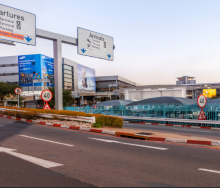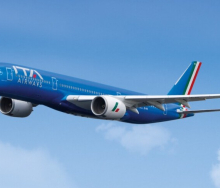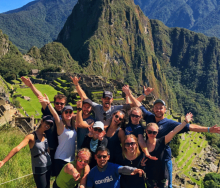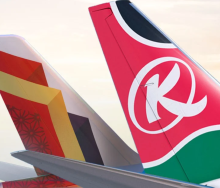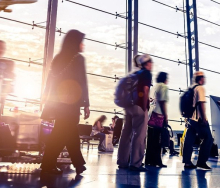Israel – the ultimate pilgrimage
DEMAND for Israel
among church groups
in SA has increased so
much that tour operators are
recommending agents book
a year in advance to secure
the group’s first choice in
accommodation.
According to David
Bradshaw of tour operator
Travel Vision, while conflict in
Israel is ongoing, it is mostly
confined to the Gaza Strip and
rarely affects tourist venues or
tourism numbers.
One of the misconceptions
about travelling to Israel is
that an Israeli stamp in your
passport will complicate
future travel arrangements to
Muslim countries. To avoid
this problem many passengers
apply for second passports in
order to separate the stamps.
David debunks this myth,
saying that on arrival in Israel
customs officials will give you
the option of placing the entry
stamp directly in your passport
or on a separate piece of
paper.
Allow check-in time
David recommends spending
at least a week in Israel
and says most of his church
groups choose to fly out on
a Monday and return on a
Wednesday. This way their
minister does not miss
too many church services.
David prefers to book direct
flights on El Al as their group
payment options are generous
but he says that Egypt Air,
Ethiopian Airlines and Turkish
Airlines offer great fares into
Israel too. For passengers
travelling on El Al, David
recommends checking in
at Ortia three to four hours
before departure as the
airline’s policy of interviewing
every passenger before
wrapping their suitcases takes
longer than the usual check-in.
“The must-sees in Israel
include Jerusalem, Bethlehem
and Nazareth of course
but clients always mention
enjoying the boat trip on
the Sea of Galilee and the
Jerusalem Sound and Light
Show. The private communion
service in the Garden of
Gethsemane and at the
Garden Tomb are very special
experiences for Christian
travellers.”
While most itineraries
include a baptism in the River
Jordan it is important to note
that some sites are more
commercial than others. “Ask
your operator to arrange the
baptism in a quiet location
away from the crowds and gift
shops,” recommends David.
He also suggests spending
more than one night in Tel
Aviv which he describes as
a wonderful, world-class,
cosmopolitan city.
“There are great hotels,
excellent shopping options,
a vibrant night life and great
beaches. Also, the city is
easy to travel around by
bus or bicycle. The nearby
arty quarter of Jaffa with its
narrow streets and pleasant
restaurants is also worth
visiting,” he adds.
Did you know?
El Al Israel Airlines has introduced two interesting new product tweaks.
Priority Seating. The new priority boarding service which may be purchased from US$6 (R84) per passenger
per flight direction. This service allows passengers to board early and reach their seats quickly and assures
passengers of a place to store hand luggage close to their seats. Gold, Platinum and Top Platinum Matmid
members, as well as passengers holding FLEX tickets, are entitled to the service at no cost.
Executive Seating. El Al passengers holding economy-class tickets can now purchase seating in the
business class cabin with economy class service. The above mentioned charge of US$300 (R4 188)
per person per flight for the executive seat can be purchased at the airport only. Note that the baggage
allowance for passengers seated in the ‘executive seats’ is in accordance with the ticket. This service is
subject to availability.
Spotlight on Jordan
DAVID
Bradshaw of
Travel Vision
describes
Jordan as
a really
underestimated
destination.
He says the
archaeological
site, Petra,
is incredible
to see but
very hot to
visit in summer and he
recommends that elderly
or unfit clients take a
horse-drawn carriage when
exploring the site. He
also describes the quiet
experience of watching the
sun set over silhouettes of
beautiful rock formations
in the Wadi Rum Desert as
something really special.
Here clients can opt to
spend a night in a local
Bedouin camp, enjoying
dinner and dancing in the
evenings.
According to David, other
sites worth a visit are
Jerash, one of the best
preserved
Roman sites in
the world, just
45km outside
Amman, and
Mount Nebo,
where Moses
first looked
down at the
Promised Land.
David was
also impressed
by the lush
and luxurious
hotels on the Jordanian
side of the Dead Sea.
He says while the Israeli
side is characterised
by hundreds of coach
clients being bused in for
a couple of hours, the
Jordanian side has a less
frenetic feel, as clients
tend to visit the resorts
for a few nights. The port
city of Aqaba does not
have great beaches, but is
known more for the scuba
diving sites south of the
city and sailing options.
David says the submarine
tour on offer there is very
enjoyable.
Book it!
Thompsons Holidays is promoting a nine-night Abu Dhabi
Formula One Grand Prix and Emirates Airline Dubai Rugby
Sevens Package from R38 814. It includes return flights
with Emirates from Johannesburg to Dubai, including
airline levies, return airport-hotel transfers, four nights’
accommodation at the four-star Novotel Abu Dhabi Al
Bustan, including breakfast daily, two days’ admission to
North, South or Marina Grandstand (Saturday and Sunday)
for the Formula One Abu Dhabi Grand Prix, access to the
after-race concerts on Saturday and Sunday, return track
shuttle transfers, private transfers from Abu Dhabi hotel to
Dubai hotel, five nights’ accommodation at the three-star
Rove Healthcare Hotel in Dubai, including breakfast daily,
three-day general admission ticket to the Emirates Airline
Dubai Rugby Sevens (Thursday, Friday and Saturday),
return shuttle transfers to the Rugby Sevens and concert
access after the matches on Saturday. Valid for travel from
November 28 to December 8. T&Cs apply.
Egyptmania returns
to Aswan over four nights.
Catching a short, earlymorning flight from Cairo to
Luxor leaves enough time to
explore the Luxor and Karnak
temples on day one before
setting off on the cruise. The
80-hectare Karnak complex –
the largest religious building
ever constructed – dwarfs
visitors with its enormous
courtyards and 15-metrewide pillars that tower 23
metres overhead.
The cruise accommodation
is four- or five-star and
fairly upmarket, although
somewhat gaudy. Travelling
along the river is extremely
smooth and you can watch
the palm-fringed shores
float past from a rooftop
deckchair or plunge pool.
All meals on board are
included and the buffet
generally featured a large
number of interesting
Egyptian dishes, bowls of
plum-sized olives, pasta, a
river-fish dish and a large
selection of brightly coloured
but inedible puddings. This
was a relief, as I would have
put on even more weight had
I also been devouring the
dessert buffet!
Valley of the Kings
On day two we boarded
a small bus that took us
through the rural plots with
flat-roofed homes and the
scattered livestock that
criss-cross the lush Nile
Valley. Quite suddenly the
landscape changed from
bright green to stark, rocky
desert as we left the flood
plains and drove into the
mountains where hundreds
of Pharaohs are suspected
to have been laid to rest
in the famous Valley of the
Kings.
So far, the hidden
entrances to over
60 tombs have been
discovered, including
those of Tutankhamun and
Ramses III and IV. I found
the Indiana-Jones-like
experience of scrambling
into small openings in
the rocks, to discover
intricately carved and
painted corridors, tunnelling
deep into the mountainside
toward the impressive
tomb chambers, absolutely
thrilling. Our ticket allowed
us entrance to three tombs
but I would like to have
visited dozens if we had had
the time. My tip would be to
skip Tutankhamun‘s tomb
as it has been completely
emptied, with most of the
contents on display in
Cairo’s Museum of Egyptian
Antiquities.
Aswan
The city of Aswan, built on a
cataract of the Nile, was of
great strategic importance
as the southern frontier of
Ancient Egypt and the empire’s
gateway into Nubia (Africa).
Today the city has a warm,
welcoming and laid-back air,
with water taxis and traditional
felucca yachts nipping back
and forth, ferrying tourists
from one bank to the other.
The markets are more relaxed
than those in frenetic Cairo
and it is recommended to
leave souvenir shopping until
you reach this final port. A
number of interesting day trips
can be organised from Aswan
such as a trip to the island
of Aglika where the Temple of
Philae is located, a camel trip
to the Christian Monastery
of St Simeon or a visit to a
nearby Nubian village. Although
pricey, a sundowner at The Old
Cataract Hotel on the banks
of the Nile, is a memorable
experience. This is where
Agatha Christie famously wrote
Death on the Nile. The views
from the hotel’s terrace extend
across the Egyptian ruins,
along the shimmering Nile and
out to the golden dunes of the
desert.
Temple of Hepshetsu
Later that day we visited
the Temple of Hepshetsu.
This imposing three-storey
terraced temple, built on
a ridge, can be seen from
miles away. The approach is
along an avenue previously
lined with sphinxes leading
from the Nile to the entrance
of temple. The ruins of a
few of these sphinxes may
still be seen. Disregarding
protocol, which did not
permit females to rule,
Hepshetsu seized power
through the rights of her
children and by imprisoning
challengers to the throne.
Egypt thrived under her
leadership. She was one of
the most prolific builders
in ancient Egypt and also
oversaw the preparations for
an expedition to Punt (now
Somalia), which famously
returned with 31 myrrh
trees, the first recorded
attempt to transplant foreign
trees. It is also speculated
that the plucky lady intended
to dig through the hillside
from her temple to reach
the Valley of the Kings,
where, as a woman, she
was forbidden from being
interred.
Abu Simbel
A visit to Abu Simbel is an
optional activity that should
not be missed, despite the
04h00 wake-up call and
three- to four-hour drive
to reach the site. The two
spectacular temples serve
as a lasting monument to
Ramses II and his Queen
Nefertari. The main temple
entrance is flanked by
four great, seated statues
of Ramses II which stare
east toward the rising sun.
Abu Simbel was originally
located on the banks of the
Nile but the entire structure
was relocated in the 1960s
to avoid flooding when
the Aswan Dam and Lake
Nasser were constructed.
Tourism growth in Egypt
Egypt became the secondfastest growing country
for tourism in Africa,
growing by 16,5% in 2018,
according to the World
Travel and Tourism Council.
The growth has been
linked to the improved
security infrastructure,
which has helped to attract
international visitors back
to Egypt’s shores. Although
the sector has not yet
fully recovered to pre-crisis
levels, the size of the
Egyptian travel economy in
2018 is the healthiest is
has been since 2010.

